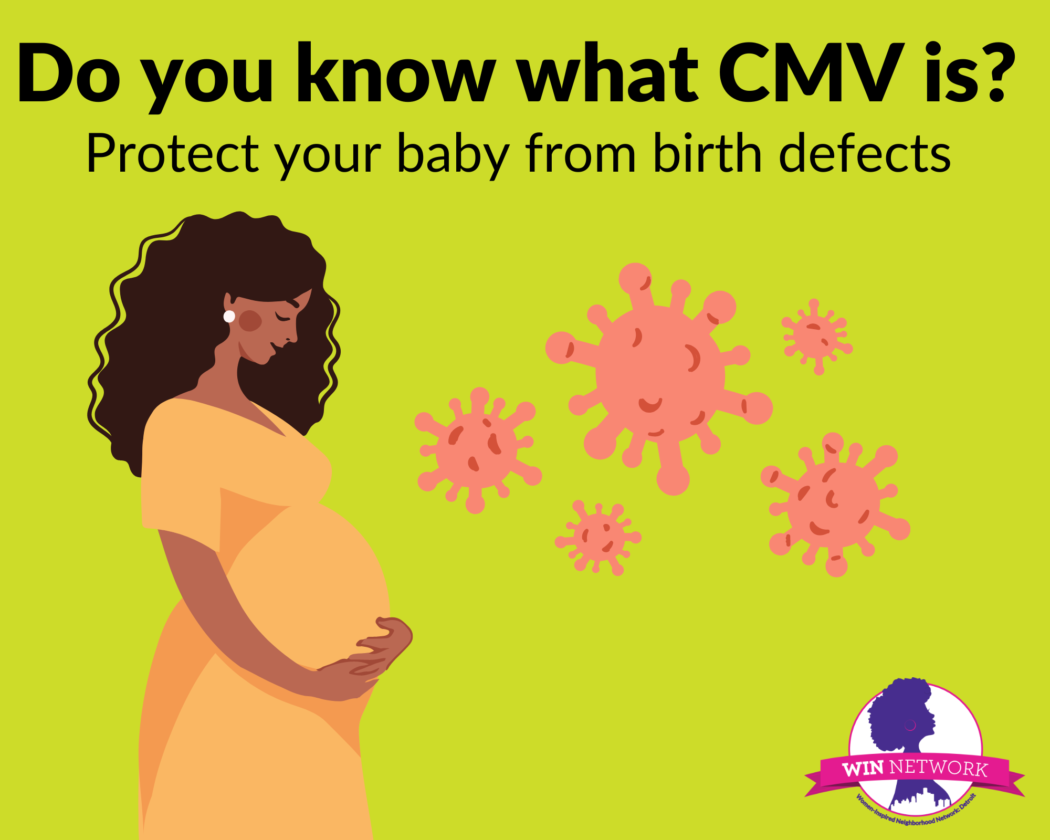What is CMV and how does it affect my baby?

What is CMV?
Cytomegalovirus (CMV) is a common virus that people of all ages can get. About 1 in 3 children gets CMV by age 5 [1]. Some babies are born with a CMV infection, which is called “congenital CMV”. Most people can get CMV during childhood when germs spread easily [2]. CMV can be spread from person to person through bodily fluids like saliva, urine, tears, and nasal mucus [3]. Symptoms of CMV are similar to the flu. Healthy people can have fever, sore throat, fatigue, and swollen glands [1]. People with a weakened immune system may have more severe symptoms affecting their organs such as the eyes, lungs, liver, esophagus, stomach, and intestines [1]. However, CMV can sometimes not cause any symptoms in healthy people, making it hard to know if you have it [2].
Why do pregnant people need to know about CMV?
1 out of 200 babies are born with a CMV infection [4]. This can cause birth defects. CMV is the most common infectious cause of birth defects in the US. Once someone has CMV, it stays in their body for life as an inactive virus, but in rare cases, it can reactivate and cause you to get sick [1]. Women who get CMV for the first time in their lives while they are pregnant can pass the virus down to their baby through the placenta [5]. However, if the mother had CMV before she was pregnant, it is unlikely that the baby will have any health problems and for CMV to be passed down. That is why it is important to get tested for CMV before getting pregnant to know if you had it before. Pregnant people who have never had CMV before need to take extra steps to not get it during pregnancy to protect their baby.
About 1 out of 5 babies born with congenital CMV will have birth defects or long-term health issues [1]. Babies with congenital CMV can have signs at birth, such as a rash, jaundice (Yellowing of skin or whites of the eyes), low birth weight, or seizures [4]. Babies with signs of congenital CMV are also at risk of having illnesses, including hearing loss, vision loss, seizures, and developmental and motor delay [4].
What can I do?
Before getting pregnant, find out if you’ve ever been infected with CMV. Ask your healthcare provider for a CMV blood test. However, if you want to test newborns for CMV, a saliva or urine test is a better option [1].
To reduce the risk of CMV infection during pregnancy, follow these simple hygiene strategies [3]:
1. Wash with care: Wash your hands for at least 15 seconds, especially after changing diapers or coming into contact with urine, saliva, mucus, and other bodily fluids.
2. Don’t share: Don’t share food, utensils, drinks, straws, or pacifiers to lower the risk of getting
CMV.
3. Kiss with care: Avoid direct contact with saliva when kissing children. Instead, kiss their forehead and not their mouths.
By using these hygiene practices, pregnant women can lower the chances of contracting CMV and protect their unborn babies. Remember, it’s always best to talk with your healthcare provider for personalized advice regarding CMV and pregnancy.
Sources:
[1] https://www.cdc.gov/cmv/awareness-month.html
[2]https://live.marchofdimes.org/find-support/blog/do-you-know-what-cmv
[3] https://cerebralpalsy.org.au/cmv/
[4]https://www.cdc.gov/cmv/congenital-infection.html
[5] https://www.mountsinai.org/health-library/diseases-conditions/congenital-cytomegalovirus

